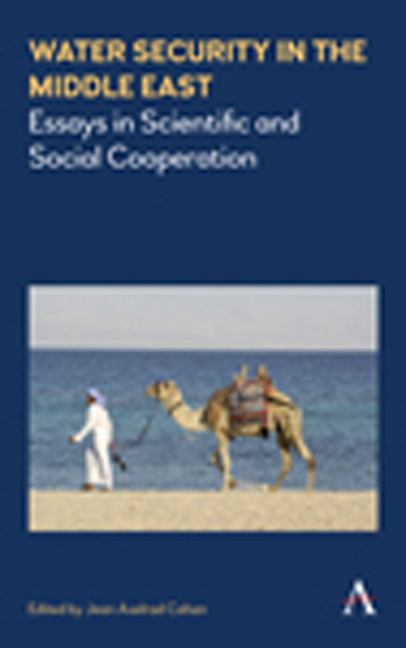Book contents
- Frontmatter
- Contents
- List of Illustrations
- Acknowledgments
- Foreword
- Introduction Water Security in the Middle East: A Role for the Social Sciences and Humanities
- Chapter 1 Cooperation Rules: Insights on Water and Conflict from International Relations
- Chapter 2 Water Security in Transboundary Systems: Cooperation in Intractable Conflicts and the Nile System
- Chapter 3 Water-Demand Management in the Arab Gulf States: Implications for Political Stability
- Chapter 4 A Watershed-Based Approach to Mitigating Transboundary Wastewater Conflicts between Israel and the Palestinian Authority: The Besor-Hebron-Be'er Sheva Watershed
- Chapter 5 The Evolution of Israeli Water Management: The Elusive Search for Environmental Security
- Chapter 6 Adapting to Climatic Variability along International River Basins in the Middle East
- Chapter 7 Water and Politics in the Tigris-Euphrates Basin: Hope for Negative Learning?
- Chapter 8 The Political and Cultural Dimensions of Water Diplomacy in the Middle East
- Notes on Contributors
- Index
Chapter 1 - Cooperation Rules: Insights on Water and Conflict from International Relations
- Frontmatter
- Contents
- List of Illustrations
- Acknowledgments
- Foreword
- Introduction Water Security in the Middle East: A Role for the Social Sciences and Humanities
- Chapter 1 Cooperation Rules: Insights on Water and Conflict from International Relations
- Chapter 2 Water Security in Transboundary Systems: Cooperation in Intractable Conflicts and the Nile System
- Chapter 3 Water-Demand Management in the Arab Gulf States: Implications for Political Stability
- Chapter 4 A Watershed-Based Approach to Mitigating Transboundary Wastewater Conflicts between Israel and the Palestinian Authority: The Besor-Hebron-Be'er Sheva Watershed
- Chapter 5 The Evolution of Israeli Water Management: The Elusive Search for Environmental Security
- Chapter 6 Adapting to Climatic Variability along International River Basins in the Middle East
- Chapter 7 Water and Politics in the Tigris-Euphrates Basin: Hope for Negative Learning?
- Chapter 8 The Political and Cultural Dimensions of Water Diplomacy in the Middle East
- Notes on Contributors
- Index
Summary
At least implicitly, many disciplines recognize that a changing climate with higher temperatures and altered precipitation patterns will require adaptive water-management strategies. Climate change necessitates a collective and coordinated response to water shortage, and states must yield to this reality. If these processes are not carefully calibrated to respond both to physical characteristics and to cultural norms, the path ahead will have grave implications for future generations who will experience human suffering, social and political discord and an impoverished environment. An important question for political scientists is this: will water insecurity— whether it is caused by access, allocation, degradation or scarcity— necessarily result in violent conflict between states?
The answer may depend on whom you ask and the region in question. Although research on water politics and international conflict has led to separate substantial literatures, this chapter considers them together and presents a tentative answer. I argue that, although literature in international relations (IR) is historically predisposed to focusing on war and interstate violent conflict, when it comes to arguments and research on water there is a decisive, if largely overlooked, consensus that it is cooperation rather than violent conflict that dictates interstate water relationships. The past is not always the best predictor of the future, but research on war and conflict thus far indicates that water insecurity is unlikely to result in violent conflict between states. As Aaron Wolf puts it, water may be a tool, target or victim of warfare, but up until this point it has not been the cause (2007, 4).
Nonetheless, a significant amount of scholarship in IR assumes, and sometimes asserts, that problems with access to freshwater and water insecurity will not only lead to violence within states but also result in interstate war (Setter et al. 2011). Especially for scholars who focus on certain regions where water scarcity is severe, where political tensions are significant and where there are no international institutions in place to promote cooperation, violent conflict is overdetermined. The Middle East is usually considered one of the likely hot zones where the quest for water is seen as a catalyst for future conflict either within states or between states (Dinar 2002).
- Type
- Chapter
- Information
- Water Security in the Middle EastEssays in Scientific and Social Cooperation, pp. 19 - 38Publisher: Anthem PressPrint publication year: 2017



